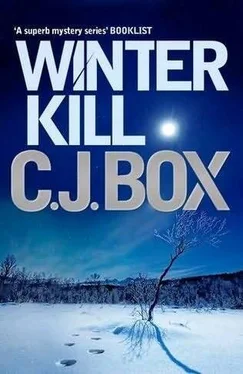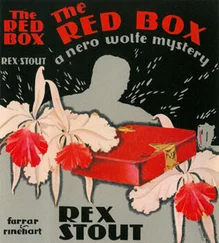Missy handed the telephone toward Sheridan. “It’s some little girl for you.”
As Sheridan took the receiver, Missy bent down near her. “I’m expecting a call from Bud Longbrake, so don’t be long.”
Sheridan made a face and turned away from Missy.
“Sherry?”
Sheridan felt a jolt shoot through her body. She immediately recognized the tiny, distant voice, where Missy had not.
“April?”
“Hi.”
“I don’t know what to say!” Sheridan looked around the room. She remembered her mother had said something about going outside to take care of their horses. Lucy was in their room, putting on makeup in front of a mirror just for fun.
“How are you guys doing?” April asked. “I miss you guys.”
“We all miss you, too. Where are you?”
“Up here. Up here in the snow. It’s really cold.”
“Then come home!” Sheridan laughed nervously.
April sighed. “I wish I could.” There was a beat of silence, and Sheridan could hear static growing. It was a poor connection.
“I’m not supposed to use the phone. My mom will really get mad if she finds out I’m talking to you.”
“Where is she?”
“Oh, everybody is at a meeting. Mom, Clem…”
“Who’s Clem?”
“A guy who lives with us. I don’t like him much, but he’s the only person who knows how to keep the heater running.”
Sheridan noticed that April’s Southern accent was coming back. Sheridan had forgotten that April had had it when she first moved in with them.
“I miss you guys a lot.” She sounded pathetic.
“April, are you coming home?”
April sighed. “I really do want to. I cry a lot. I like my mom and all, but…”
“What’s it like there?” Sheridan asked. She was in the kitchen now, parting the curtains. The snow was coming down so hard that the corral and shelter were smudges in the snow. She couldn’t see her mother.
“It’s cold up here. Really cold. I just stay inside all day. Last night, there were awful sounds outside that kept everybody awake. Clem said it was rabbits being skinned alive.”
“You’re kidding!”
“No. How’s Lucy?”
Sheridan tried to picture April as she talked. She pictured her in a corner, wearing rags. For some reason, Sheridan couldn’t see April’s face, just her tangled blond hair. The image of April without a face made Sheridan shiver.
“Lucy’s fine. Goofy as always. She’s been dressing up with Grandmother Missy and going to town. Right now she’s in our room putting on makeup.”
April laughed a little. “She’s our little girlie-girl, isn’t she?”
Sheridan felt tears welling in her eyes. April seemed so close, but she wasn’t.
“Do you want me to go get her? Do you want to talk to her?”
Over the phone, Sheridan heard the sounds of adults talking in the background. Their voices were muffled.
“Uh-oh, somebody’s coming,” April said frantically, her voice climbing in register. “ ’Bye, Sherry. Tell Lucy I miss her. TellMomandDadIlovethem…”
The phone disconnected, and Sheridan stood there, tears rolling down her cheeks.
“Good-bye, April,” she said to the dead telephone.
Sheridan heard the high whining sound of a snowmobile outside. She ran across the living room and saw out the window that her dad was home. His pickup was in the driveway, and he was driving his snow machine from the garage up a ramp into the bed of the truck.
Without putting on her coat or boots, she stepped outside on the front porch in the deep snow. Even though she was wearing only socks, she couldn’t feel the cold.
Her dad saw her and killed the engine of the machine. He stood up in the back of his truck, looking at her like she was crazy.
“You need to get inside and close the door, Sheridan,” he said. “What’s going on?”
“Dad, I just talked with April.”
“You what ?”
“You’ve got to save her, Dad. You’ve got to.”
Joe Pickett moved silently through the trees in the dark. Although the moon was obscured by the storm clouds, there was enough ambient light that the virgin snow appeared a dark blue. The trunks of trees rose from it and the branches melded into the night sky. The snow had decreased in its fury, although it had not stopped. It sifted dust-like through the branches, so powdery that it sometimes hung suspended in the air. The temperature had dropped into the low teens, cold enough to evince an occasional pop or moan from freezing timber.
He was on Battle Mountain, approaching the Sovereign Citizen compound on foot from the north. He was not yet close enough to see lights or hear voices. He was there to arrest Spud or save April, or both. He was not thinking clearly.
Joe had been prevented from reaching the compound via Bighorn Road by two things. The first was the snow, which had literally rendered the road impassable. The second was the sheriff’s Blazer, belonging to Deputy McLanahan, parked at the beginning of the summit. They had relocated the roadblocks farther down the mountain, but they were roadblocks nevertheless. Joe wasn’t sure he could talk his way through it, or that he even wanted to try. It was obvious that the assault would be at least a day away, given the conditions. Even Munker wouldn’t be hot-blooded enough to confront the camp in the dark, Joe reasoned. The Sno-Cats they would use in the morning had been assembled, and were parked shoulder to shoulder near the Blazer. Joe had seen them through his binoculars, and had seen both Munker and Portenson checking out the Sno-Cats from the backs of borrowed Forest Service snowmobiles. Joe had driven away, hoping he hadn’t been seen, and had taken the other road.
As it darkened, Joe had driven as far as he could up Timberline Road until the snow got so deep that he almost got stuck again. Rather than try to go any farther with the night coming on, he pulled out the ramps and backed his snowmobile out of the pickup. Then he mounted the snowmobile and roared into the black timber. He cut through the forest rather than go around it, through a huge, dark, wooded wilderness that had been declared officially closed by Lamar Gardiner’s Forest Service. The sledding had been a challenge. The snow was untracked, and so fresh and deep that at times the machine bogged down in it, the rear tracks digging down into the snow rather than hurling him over the top of it. The snout of the machine would raise and point to the sky as the snowmobile foundered in the powder. When this happened, Joe’s adrenaline rushed through him and he threw his weight forward or back with controlled violence, levering himself free and allowing the track to grip and hurl him forward. He knew that if he got stuck in snow this deep, in temperatures this low, he might never get out alive. No one knew where he was, and the Sovereigns certainly weren’t expecting him.
If I get stuck, Joe said to himself in a mantra, I die.
And he could not slow down, because when he did, sometimes involuntarily as a result of trying to pick his route through dark timber with the single headlight, he could feel the machine start to sink and settle into the four-foot-thick powder. The only way to keep moving and not get stuck was to keep the machine hurtling forward over the top. So he had run the engine much faster than he was comfortable with, keeping the headlight pointing south, sometimes clipping trees so closely that he was showered with bark and snow from their branches.
Miraculously, he had made it through the timber and out the other side. The machine’s engine was loud, however, and he didn’t want the Sovereigns to hear him coming, so he had shut it down near the top of the mountain beneath a granite outcropping that had shielded the ground from much of the snowfall. Before leaving it, he had filled the tank with gasoline from a can he’d strapped on the back of the machine earlier. Buckling on oval snowshoes, he had left the snowmobile and its loud engine and worked his way south in silence.
Читать дальше












